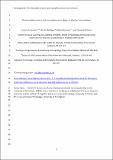The interaction of social and perceivable causal factors in shaping ‘over-imitation’
Abstract
Over-imitation has become a well-documented phenomenon. However there is evidence that both social and visible, physically causal factors can influence the occurrence of over-imitation in children. Here we explore the interplay between these two factors, manipulating both task opacity and social information. Four- to 7-year-old children were given either a causally opaque or transparent box, before which they experienced either (1) a condition where they witnessed a taught, knowledgeable person demonstrate an inefficient method and an untaught model demonstrate a more efficient method; or (2) a baseline condition where they witnessed efficient and inefficient methods performed by two untaught models. Results showed that the level of imitation increased with greater task opacity and when children received social information about knowledgeability consequent on teaching, but only for 6- to 7-year-olds. The findings show that children are selectively attuned to both causal and social factors when learning new cultural knowledge.
Citation
Burdett , E R R , McGuigan , N , Harrison , R & Whiten , A 2018 , ' The interaction of social and perceivable causal factors in shaping ‘over-imitation’ ' , Cognitive Development , vol. 47 , pp. 8-18 . https://doi.org/10.1016/j.cogdev.2018.02.001
Publication
Cognitive Development
Status
Peer reviewed
ISSN
0885-2014Type
Journal article
Description
This work was supported by a John Templeton Foundation grant ID 40128 to AW and K Laland.Collections
Items in the St Andrews Research Repository are protected by copyright, with all rights reserved, unless otherwise indicated.

